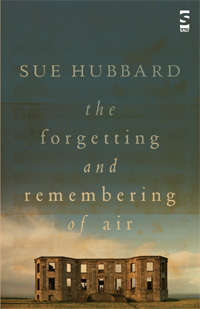In this third full-length collection, we are made to feel the elemental forces of weather, the ‘exhalation of tides’, the rhythms of language searching to reach beyond its limits in the need to apprehend
“a landscape of shadowed voices,
beating wings and tumbling streams
where we’re not so estranged
from the language of stars.” Dreaming of Islands
Whether the poems evoke the isolation of the human and the harsh but redemptive power of landscape, the attempt to come to terms with the ravages to self, the struggle to survive and to continue to love, there is an acute sense of journeying to the edge of the ‘habitable world’ in order to return, better able to live.
In ‘Love in Whitstable,’ dedicated to a grandson, Louie, Hubbard writes,
“Believe me, if I could, I’d
make a deal
with that God
I hardly believe in,
just to show you what
it takes to be here.”
Alongside an unswerving urgency, this work is peppered with felicitous detail and wry tenderness:
“the homely brown cow
with the film-star fringe” (A Meaningful speech)
‘your small body shivering
inside your Ladybird airtex vest,
towel draped prize-fighter style
around your shoulders,’ (Nits)
In a beautifully atmospheric backward glance, Hubbard gives us:
“as in the gloaming
of that smoke-filled gloom, I longed
to become what I could never be,
a light between despair and
luminosity:” Smokers
Hubbard’s painterly eye has a natural affinity for the page which she would imbue with the sensual layerings of a visual medium:
”I try to write a line of colours,
but words are a string of biro scrawls
without air or light or hue.” White Canvas
But neither does she shy away from the predatory nature of art, the colonising role of the artist, such as in Blood Paintings, after Andy Goldsworthy:
“he stuffed the sac of its stomach
with blood and snow,
hanging it by its hind legs
from a hook in the Dutch interior
of the cold pantry.”
A much respected art critic, Hubbard uses her knowledge and understanding
of this medium to powerful effect.
In the section, Over The Rainbow, the poet explores, with a deft touch, a precise working of the image, representations of women in art and history; the destructive, sometimes violent force of love and sex, rigidly defined and culturally restrictive:
“alone amid the long
shadows of the bunker,
gave me
my wedding gift, the thin glass vial
placed like a fresh-water
pearl in
my palm.” Eva
What remains with me above all else, is the poet’s evocation of place, both spiritual and visceral, and most potent perhaps in the sequence Dreaming of Islands, a gathering into itself of the inchoate, ‘anthracite dark’, the expanses of light –– the dark just about mitigated by the light –– which the poet must shape into human utterance. There’ s a defining sense of the healing properties of close observation, of how landscape can focus and restore us against the noise and clamour. A profound instinct that here in these forbidding landscapes, these islands, less shaped by the human, a language of compassion and redemption can patiently, courageously be brought into being.
In a postmodern world, there is an unapologetic desire to create a rich, mellifluous language within the spareness and anti-Romanticism of a post-modern world, one which can recalibrate the atavistic, almost Pantheistic presence of nature in a secular, degraded world. Again and again, these poems articulate what it is to work through pain and hardship, towards hard-won acceptance and the possibility of forgiveness:
“as the morning slips through
my fingers like sand,
like love, and the tireless waves push on
into their own futures, as I reach
for a pen, struggling to transcribe
word by word, sentence by sentence,
this fragile
… yes”
Order your copy of The Forgetting and Remembering of Air, published by Salt, here.

